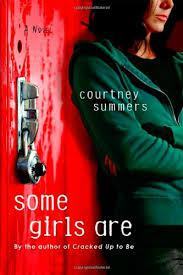Banned Books Month Guest Post from Stephanie Wardrop: A Plea for (Critical) Reading before Banning a Book
I read Courtney Summers’ recently banned book SOME GIRLS ARE almost in one sitting. I didn’t read it so quickly – despite having plenty of other things to do – because it was such a fun read. It was anything but fun. In fact, most of it was unpleasant at best, disturbing at worst. But that doesn’t mean anyone else should be prevented from reading it, as many students were this summer due to one school district’s response to one parental complaint.

St. Martin’s Griffin, January 2010.
The novel was one of two choices for summer reading for incoming freshman in honors English at West Ashley High School in Charleston, South Carolina – until one parent complained and it was removed from the short list of choices. I won’t go into the whole sequence of events; they have been widely documented and you can read about them here. Suffice to say that as a writer and a teacher of literature, I am against the banning of books, especially when a book is banned due to a single complaint, while as a mother I am sympathetic to the desire to protect kids from potential dangers, though I am not quite sure exactly what those imagined dangers are in this case.
Melanie McDonald, the mother does not make clear in the letter Charleston newspaper The Post and Courier what she objects to in the book that she deems “trash.” She mentions the depiction of a skeevy math teacher who likes to look ay female students’ legs when they go up to the chalkboard (I remember at least one of those in my student days), “body shaming about the size of the lead character’s breasts (I either missed this part of the book myself or did not see it as “body shaming”) and a “sexual reference so explicit” she would not quote it in her letter (I’m guessing it’s the line about “flicking” a girl’s “bean,” which we as readers are meant to find gross and insulting and evidence that the speaker is a Neanderthal misogynist). She says that educators are entrusted to “mold our children” – and tells her readers “make no mistake that high school students are children.” She declares that she could not get past page 74 of the book (at the time of her writing the letter- she finished it later) and deems SOME GIRLS ARE “trash” and “completely inappropriate for any high school student.”
Many others have commented on the obviously moralism in calling the book “trash” and the injustice in allowing one parent to decide what is appropriate for all high school students, and they have done so quite eloquently. In this post, I would like to better understand what makes the book so “inappropriate” and on what grounds, exactly, Ms. MacDonald objects to SOME GIRLS ARE. Does she fear that the events depicted will expose students for the first time to drug use, alcohol, bullying, violence, and suicide? Does she feel it will influence students to want to behave like the characters in the novel? If her anxiety lies in the former, then I think, as many have argued, most freshmen students have been exposed to these sad facts of teen life long before they pick up Summers’ book, if not in their actual lives then through exposure by other media (television, movies, news stories, the internet).
But if the fear and distaste lies in the latter – a concern that students will want to emulate those depicted in the novel – I can’t help wondering how careful a reader Ms. MacDonald is, and how little faith she has in her daughters’ peers’ critical reading abilities. Even if she had stopped reading at the first 74 pages and not continued to the end, surely Ms. MacDonald recognized that the novel present a cautionary tale, one with a moral, even, that could please almost everyone, far more than it depicts a titillating look at the lifestyles of the rich and adolescent. I could examine what happens in those first 74 pages, but it will serve my point as well to focus instead on a “close” or critical reading of the first paragraphs alone, contained in the preface, titled “Before.”
The preface all but spells out the lesson the main character, Regina, will learn. It reads:
HALLOWELL HIGH:
You’re either someone or you’re not.
I was someone. I was Regina Afton. I was Anna Morrison’s
best friend. These weren’t small things, and despite what
you may think, at the time they were worth keeping my
mouth shut for.
It seems important to me to consider this introductory passage – like the rest of the novel- as descriptive rather than prescriptive. When Summers says through Regina “You’re either someone or you’re not,” she’s describing the way the social hierarchy works at the very dysfunctional Hallowell High, not the way it should work anywhere on the planet. But a lot of American readers will recognize their schools as being similarly plagued by mean girls and in-groups. The second paragraph tells us that our narrator, Regina, was once “someone” because she was “Anna Morrison’s best friend;” she had an identity in the in-group only in relation to queen bee Anna Morrison. We learn that something has happened that Regina never spoke of in order to maintain her elevated status. Because she is speaking in the past tense, we know she lost that status and that whatever she kept her mouth shut about, she shouldn’t have.
As a teacher, it’s my job to walk students through a critical reading like the brief one presented above, and I can only assume that the teachers at West Ashley High School would have done the same had they been allowed to. They might even have pointed out the sad irony in the main character’s name, Regina, who is no longer a queen and slowly realizing the awful things she did as one of Anna’s flunkies to earn that crown.
In those first 74 pages, we learn that Regina loses her status in the in-group because Kara, a girl on the fringes of that group, advises her not to report it when made Anna’s boyfriend sexually assaults Regina at a party while Anna is passed out drunk a few feet away from them. Kara offers this counsel for self-serving reasons: so that she can get into the group, become Anna’s new bestie, and “freeze out” Regina, and that’s exactly what happens. No one believes that Regina did not sleep with her best friend’s boyfriend and they ostracize and bully Regina as Regina, under Anna’s command, ostracized and bullied others. Regina later learns that one girl, whom she had liked very much before Anna had bid her to torment her, even attempted to kill herself because of their bullying.
Is Regina a victim in the treatment she receives? Yes, but she is also a pretty horrible person, and the book shows this rather unflinchingly without ever hinting that she deserves to be assaulted because she was a horrible person. Perhaps it is this complexity, Summers’ refusal to present a moral absolute here in the novel, that some readers find troubling. Few characters, including Regina, are either wholly good (perhaps Michael and Liz are) or bad (I’d slot Anna and possibly her ex-boyfriend in this category). In the rest of the novel, Regina begins to come to terms with what she’s done and it’s not an easy path – there’s not even much of a clear resolution in the end, as there rarely is in real life. It’s an ugly story, filled with violence between privileged, popular girls and “teachers [who] never go out of their way to notice anything” (45), probably because they feel powerless to do so. Nonetheless, for those readers looking for a moral, SOME GIRLS ARE certainly presents a few: “Don’t be mean—it may come back to you, karmically.” And “don’t sell your soul for popularity.”
There are so many conversations that a book like this could start in the classroom, ones that might finally get to real, close-to-home concerns for the students, and it is a shame that this opportunity was forfeited because of one complaint. Ironically, perhaps, though, the banning drew a great deal of attention to the book and is garnering it hundreds of new readers who may otherwise never have discovered it. The sites Book Riot and Stacked solicited donations of copies of the book and, as of this writing, have collected 830 copies and $600 in donations.
This turnaround hardly marks a triumph against censorship, though. The only thing that could end banning and censoring books is reading carefully and critically, which is exactly what a high school English class is designed to do.

Stephanie Wardrop.
Stephanie Wardrop is a YA writer whose SNARK AND CIRCUMSTANCE series is an Amazon category bestseller. When she’s not reading or writing, she’s hanging out with her family, teaching writing and literature at Western New England University, and herding cats.








